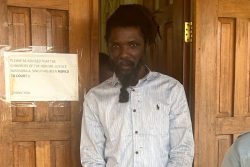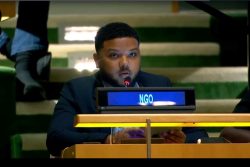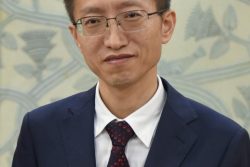Dear Editor,
For two consecutive days (March 30 and 31), PNC and Opposition Leader, Mr Robert Corbin, has been featured among the lead stories of your newspapers, first announcing that he would not be his party’s presidential contender in the 2011 elections, and then generating a buzz among politicians who view this announcement as an opening or opportunity either for a better or different PNC or a coming together of opposition political parties to form a formidable alliance to unseat the PPP.
But deep within my spirit, I am tempted to yell at these politicians, “Not so fast!” And the reason is simple: Mr Corbin said in the run-up to the 2006 election, when the PNC agreed to be part of ‘big tent coalition’ being touted, that he had no problem standing down as the tent’s presidential candidate. Well, the tent collapsed, the PNC contested as a single entity and Mr Corbin continues to be the leader of his party and the main opposition leader.
The following year, 2007, he withstood a surprising challenge from Mr Vincent Alexander that left political bruises and bad blood between camps for and against his leadership. Last year, he withstood a separate yet unexpected challenge from Mr Winston Murray, but the diagnosis of political damage from that fight remains inconclusive. What is rather enlightening here, however, is not his ability to withstand challengers, but the fact that there are enough PNC members who feel he should step down, and unless he can win over those disaffected members, he risks running a divided party as it will continue haemorrhaging members.
Now, even if he sticks to his decision not to be the party’s presidential candidate in 2011, does this automatically mean he will also step down as party leader, or will he seek to retain this post so he can influence the decision-making of whoever is to be the candidate? I say that unless and until he steps down as party leader, those who see an opening or opportunity should proceed with extreme caution, because this offer to step down could well be a ruse to gauge the kind of support he still has in the party. As the saying goes: ‘Play dead to see what kind of funeral he will have.’
If he thinks he has strong, but not the majority or full, support of the party, he could easily reconsider his offer at the appropriate time. He did something close to this last year, and certain members became vocal and boisterous in their support of his leadership, and it resulted in him still being there. But what remains a mystery is his desire to hold on to the party leadership post, even though he and the party are virtually ineffective against Jagdeo’s machinations. Some observers like me harbour the belief that a shared governance deal with President Jagdeo (not necessarily between the PPP and PNC) may be in the works, so I’d caution us against rushing to read aloud his political eulogy while he is still alive.
Meanwhile, Mr Raphael Trotman, leader of the AFC, has wisely noted that the parties in opposition have to decide whether they want to remain in opposition in perpetuity or come together to challenge the PPP. I take this to mean, while he is in favour of some sort of political alliance of opposition parties, it is not an alliance that includes the PPP or PNC, but the door is opened to individuals from either party with a genuine desire for change in their own parties, but even more so in the way government is run.
I also especially admire his bravery when he reportedly said, “I think we all have to recognize that no one of us on our own can stand up against the government. We can score points but if we are divided we would not be able to bring them down.” Yes, this government that runs on wheels of corruption needs to be booted before this cancer of corruption becomes terminal and destroys the entire country. It is no longer enough to acknowledge the prevalence of corruption; it is now necessary for those who are fed up and believe they can help make change possible to stand up and be counted.
To this end, what I think would be critical for such an alliance of reform-minded politicians, is to work assiduously to include civic society stakeholders who share the brightening vision of political change. By including stakeholders from the wider society, the picture of a truly broad-based coalition will become increasingly clearer to all Guyanese so that, unlike past attempts to change the PPP-PNC political dynamic, this time around more Guyanese will see that change is within our grasp.
Persons interested in helping make change happen must be willing to check their egos, isms and schisms at the door and work as a team, because at this strategic juncture, it is not just about getting rid of the PPP, but taking back and straightening out the government, so that not only the checks and balances system gets restored, but the people of Guyana finally feel they are part of the government. It will take some time to achieve the ultimate goal, but the process of true change must change gear and pace.
I close by saying I am mindful of the opinions of those who believe the Guyanese electorate will continue to vote race, regardless who leads the PPP or the PNC, or that it is naïve to think there can ever be a political alliance that excludes the PPP and or the PNC. My gut instinct is telling me that while some will continue to vote along ethnic lines, there is a groundswell of dissatisfaction and disillusionment among people of all races with the PPP and PNC, and if the AFC plays its cards strategically by targeting this group that cuts across racial lines, it can help usher in the change we have been looking for since the British Union Jack was lowered on May 26, 1966.
Yours faithfully,
Emile Mervin








